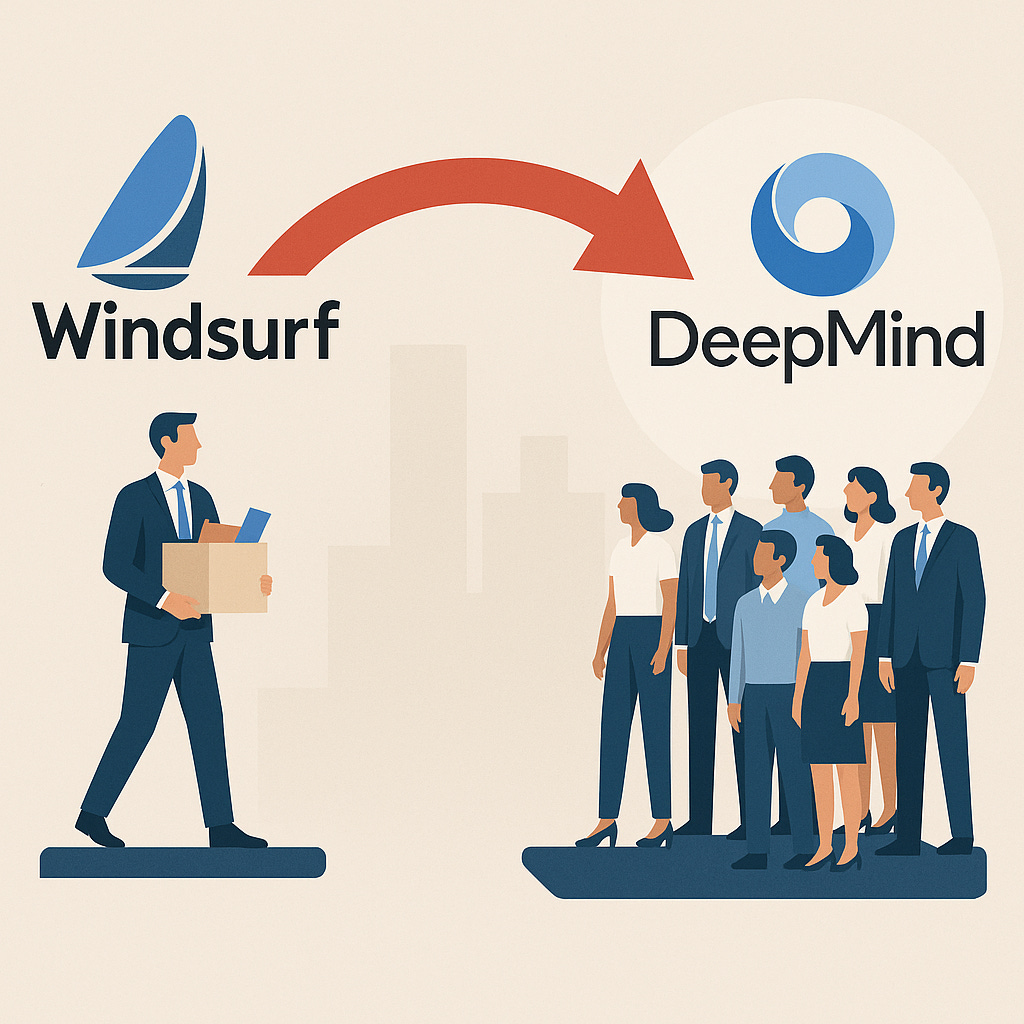The Hollow Exit: Lessons for Founders from the Windsurf Fiasco
Windsurf’s $2.4B deal sparked headlines—then backlash. This deep dive explores founder ethics, equity betrayal, and how startup exits are failing their teams.
On a rain-slick Tuesday in July, news broke that Windsurf, a red-hot AI code-generation startup, had secured a $2.4 billion deal with Google. Twitter (or X, if we must) erupted in applause. Headlines screamed “landmark acquisition.” LinkedIn congratulated itself. Tech bros were euphoric.
But in a Slack channel buried deep in the bowels of Windsurf HQ, the mood was less celebratory.
There was no champagne. No Zoom calls filled with teary gratitude. No heartfelt company-wide email from the founder saying, “We did it—together.” Instead, there was confusion. Silence. A few polite messages of “congrats” to colleagues who had just accepted roles at DeepMind. And a growing sense of betrayal.
Because Windsurf wasn’t acquired at all.
What actually happened was a reverse acquihire—a deal in which Google licensed the company’s intellectual property, scooped up its CEO, co-founder, and a curated slice of top engineering talent... and left the rest behind. The company still technically exists, but it’s now a shadow of itself: leaderless, rudderless, and full of employees holding equity in what is essentially a hollowed-out shell.
The founders walked away with nine-figure payouts. Most early employees? With unvested options, evaporated hope, and job listings for other coding startups suddenly flooding their browser tabs.
It’s a familiar tune, only louder this time. In an industry that worships speed, scale, and success, The Hollow Exit is becoming the default encore. Founders chase liquidity. Investors seek returns. And the employees—the ones who traded stable salaries for stock options and startup dreams—are handed nothing but a new company Slack emoji: 🪦.
This isn’t just a story about one company. It’s a mirror to our ecosystem—a system that’s slowly forgetting the social contract it was built on.
If Windsurf is a cautionary tale, the caution isn’t about reverse acquihires. It’s about what happens when founders forget who they’re leading.
In this issue of The Founder's Brew, we explore the fallout from Windsurf’s $2.4B reverse acquihire by Google—a deal that enriched a few but left many behind. We unpack how such exits challenge the startup social contract, examine the responsibilities founders carry beyond shareholder value, and outline how to structure fairer outcomes. If you’ve ever offered—or accepted—equity as belief in a mission, this one’s for you.
🚀 Today’s Issue at a Glance
The Startup Social Contract: Equity, Mission, and Trust
Exit Types 101: Acquisitions, Acquihires, and Reverse Acquihires
Founder Responsibilities: More Than Just Shareholder Value
The Windsurf Example: Dissecting the Ethical Failure
What Good Looks Like: Founder Playbooks for Ethical Exits
Welcome to The Founder’s Brew, 🔒subscribers-only🔒 offering by The Percolator dedicated to entrepreneurs & start-up enthusiast. Each week we share tools, resources and insights to help you grow in your founder journey.
🚀
Now, you can Upgrade your Subscription for Free when you Invite your Friends to Subscribe to The Percolator
In the startup world, we tend to romanticise exits. They’re the punctuation marks in a founder’s mythos—the full stops at the end of a hustler’s fairy tale. The garage-to-Google journey. The garage-to-gold rush. The product-market fit so potent it makes a trillion-dollar giant say, “We’ll take it.”
But like most myths, startup exits are more complicated than the lore suggests. And occasionally, they’re not even exits at all.
Windsurf was supposed to be one of the good ones. Founded by a pair of Stanford-bred wunderkinds, it had the makings of a tech fairytale: an elite AI team, enterprise traction, and a war chest of funding from every notable VC from Sand Hill Road to Shoreditch. In just under two years, it became one of the most talked-about startups in the AI tooling space, building foundational models designed to code faster—and arguably smarter—than your average human.
Then came the Google deal. On paper, it was a blockbuster. A $2.4 billion valuation. DeepMind access. A non-exclusive IP license that, from the outside, looked like an acquisition. But there was one small problem: Windsurf wasn’t acquired. No stock changed hands. No company changed ownership. Just a talent siphon and a tech license—and an elegant detour around the usual regulatory red tape.
To some, it was a clever way to maximise value and avoid antitrust scrutiny. To others—particularly the employees left behind—it felt like abandonment. There was no liquidity event. No stock option payout. The ESOPs? Still stuck in a cap table now disconnected from the company’s crown jewels. It was a ghost exit, a corporate sleight-of-hand.
And yet, no laws were broken. No contracts violated. Everyone involved acted “rationally” by the numbers. Which raises the uncomfortable question: If this was all above board, why does it feel so wrong?
This article isn’t an exposé. It’s not a manifesto, either. It’s a reflective post-mortem—and a provocation. What do founders owe to the people who help build their companies? What’s the real value of equity if the endgame only rewards a select few? And what, exactly, should ethical leadership look like when the term sheet comes knocking?
Keep reading with a 7-day free trial
Subscribe to The Percolator to keep reading this post and get 7 days of free access to the full post archives.



